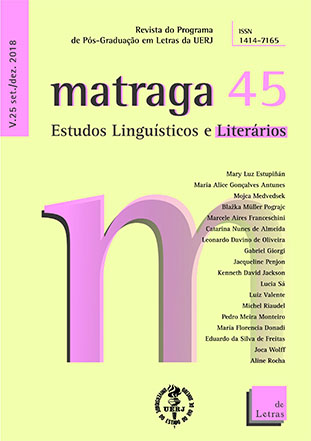‘Un suelo que no deja de moverse:’ temporalidades no-humanas de Nuno Ramos
DOI:
https://doi.org/10.12957/matraga.2018.36772Palavras-chave:
Nuno Ramos, temporalidade, biopolíticaResumo
Provavelmente algumas das mais significativas investigações das artes e literaturas contemporâneas no Brasil focalizam a questão da temporalidade, o limiar entre os vivos e os mortos e as formas em que as temporalidades e o anacronismo conflitantes articulam uma crítica do presente. Neste contexto, as instalações e escritos de Nuno Ramos, trabalhando no terreno instável entre os vivos e os mortos, o orgânico e o inorgânico, o fossilizado e o espectral, representam uma intervenção decisiva. Na obra de Ramos, a memória nunca é inteiramente humana; é irredutível ao domínio da subjetividade nem às narrativas compartilhadas do coletivo. De livros como Cujo ou Junco até a matéria fossilizada presente em muitas de suas obras, a relação entre a vida e a morte é tanto política quanto tecnológica e não-antropomórfica - é, em outras palavras, biopolítica. Este artigo analisa as formas pelas quais a configuração de tal perspectiva crítica na obra de Nuno Ramos interroga e reformula as formas em que a temporalidade e a interface política estão onde a própria noção de vida - a bios que articula a biopolítica - está em jogo.
---
Original em espanhol.
Downloads
Downloads
Publicado
Como Citar
Edição
Seção
Licença
AUTORIZAÇÃO
A Matraga – Revista do Programa de Pós-Graduação em Letras da UERJ está autorizada a publicar o artigo ora submetido, caso seja aceito para publicação online. Fica atestado que a contribuição é original, que não está sendo submetida a outro editor para publicação, e que a presente declaração é a expressão da verdade.
Os trabalhos publicados no espaço virtual da Matraga – Revista do Programa de Pós-Graduação em Letras da UERJ serão automaticamente cedidos, ficando os seus direitos autorais reservados à Matraga. Sua reprodução, total ou parcial, é condicionada à citação dos autores e dos dados da publicação.

A Matraga utiliza uma Licença Creative Commons - Atribuição-NãoComercial 4.0 Internacional.





